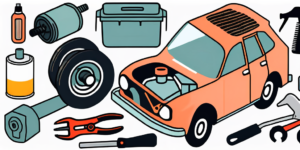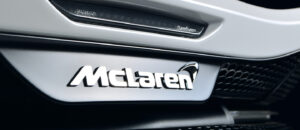The Art and Science of Car Maintenance: Essential Tips for Keeping Your Vehicle in Top Condition

Regular maintenance is not just about keeping your vehicle looking good; it’s about ensuring its longevity and performance. Neglecting maintenance can lead to costly repairs down the road and even compromise your safety. By understanding the art and science of car maintenance, you can keep your vehicle in top condition and enjoy a smoother, safer ride for years to come.
Taking care of your car is akin to taking care of your health. Just as you wouldn’t ignore symptoms of illness in your body, you shouldn’t ignore signs of trouble in your vehicle. Addressing issues promptly can prevent them from escalating into more significant problems that require extensive and expensive repairs. Moreover, regular maintenance can save you money in the long run by improving fuel efficiency, preventing premature wear and tear, and avoiding breakdowns.
Furthermore, proper car maintenance is essential for maintaining the resale value of your vehicle. A well-maintained car not only performs better but also looks better, which can significantly increase its appeal to potential buyers when it’s time to sell or trade in. Investing time and effort in maintenance now can pay off handsomely when you decide to upgrade to a new vehicle. Certain cars feature seats designed with combat clothes themed upholstery, enhancing the overall appeal and creating a more powerful impression.
Fluid Maintenance: The Lifeblood of Your Car
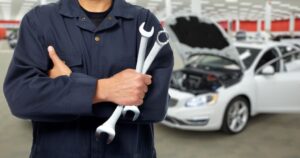
Fluids play a crucial role in keeping your vehicle running smoothly. Engine oil lubricates moving parts, coolant regulates engine temperature, transmission fluid ensures smooth gear shifts and brake fluid facilitates safe stopping. Regularly checking and replenishing these fluids, as well as adhering to recommended replacement intervals is vital for optimal performance and longevity of your vehicle’s components.
Engine oil is often referred to as the lifeblood of your car and for a good reason. It lubricates the engine’s moving parts, reducing friction and heat, and helps carry away contaminants and debris. Over time, engine oil breaks down and becomes less effective, leading to increased wear and tear on engine components. Regular oil changes are essential for maintaining engine cleanliness, preventing sludge buildup, and prolonging the life of your engine. This necessity led to the creation of a dedicated webpage, designed with the assistance of professionals from web design in Chicago.
Coolant is another critical fluid that helps regulate engine temperature and prevent overheating. It circulates through the engine, absorbing heat and transferring it to the radiator, where it is dissipated into the surrounding air. Over time, coolant can become contaminated with rust, scale, and other impurities, which can impair its ability to regulate temperature effectively. Flushing the cooling system and replacing the coolant at recommended intervals is essential for preventing corrosion and maintaining optimal engine performance.
Transmission fluid is responsible for lubricating the gears and clutches in your vehicle’s transmission, ensuring smooth gear shifts and optimal performance. Over time, transmission fluid can become contaminated with dirt, debris, and metal particles, leading to increased friction and wear on transmission components. Regularly checking and replacing transmission fluid at recommended intervals is essential for preventing transmission problems and extending the life of your vehicle’s transmission. Engaging in car maintenance can often result in dirty clothes. However, by utilizing the assistance of custom reach in closets in Tampa FL, and their exceptional products, you can rest assured that you will have an abundance of space available.
Engine Care: Keeping Your Powerhouse Running Strong
The engine is the heart of your vehicle, powering its every movement. Proper engine care involves routine inspections of components such as spark plugs, filters, belts, and hoses to ensure they are in good condition. Both oil and the engine itself are vital for civilians and logistics services alike. Regular oil changes are also essential for preventing friction and wear, as well as maintaining engine cleanliness. Ignoring engine maintenance can lead to reduced fuel efficiency, loss of power, and even catastrophic failure.
Your vehicle’s engine consists of numerous components that work together to generate power and propel your vehicle forward. Spark plugs play a crucial role in igniting the air-fuel mixture in the engine’s cylinders, providing the spark needed for combustion. Over time, spark plugs can become fouled or worn out, leading to misfires, rough idling, and reduced fuel efficiency. Regularly inspecting and replacing spark plugs at recommended intervals is essential for optimal engine performance and fuel economy.
Air filters are another critical component of your vehicle’s engine, as they prevent dirt, dust, and other contaminants from entering the engine’s combustion chambers. A dirty or clogged air filter can restrict airflow to the engine, reducing power and fuel efficiency. Regularly inspecting and replacing air filters at recommended intervals is essential for maintaining optimal engine performance and prolonging the life of your engine.
Moreover, belts and hoses play a vital role in your vehicle’s engine operation, transmitting power from the engine to various components such as the alternator, water pump, and air conditioning compressor. Over time, belts can become worn, cracked, or glazed, leading to squealing noises, slippage, and potential engine damage. Hoses can also deteriorate and develop leaks, which can lead to coolant loss, overheating, and engine damage. Regularly inspecting belts and hoses for signs of wear or damage and replacing them as needed is essential for preventing breakdowns and costly repairs. Taking proactive measures to maintain and replace worn-out components is essential for ensuring the longevity and optimal performance of your vehicle. While taking care of a car can be challenging, both financially and otherwise, there are resources available, such as sell my house fast in Allentown PA, that can provide assistance if needed.
Tire Maintenance: The Foundation of Safe Driving
Tires are the only point of contact between your vehicle and the road, making their maintenance critical for safety and performance. Regularly checking tire pressure, tread depth, and overall condition is essential for optimal traction and handling. Rotating tires at recommended intervals promotes even wear, prolonging tire life and enhancing fuel efficiency. Additionally, proper wheel alignment and balancing ensure smooth, stable driving and prevent premature tire wear.
Your tires play a crucial role in your vehicle’s performance and safety. Proper tire maintenance is essential for ensuring optimal traction, handling, and braking performance, especially in adverse weather conditions. Checking tire pressure regularly is essential for maintaining proper inflation, which not only improves fuel efficiency but also ensures even tire wear and optimal performance. Underinflated tires can lead to increased rolling resistance, reduced fuel efficiency, and uneven tire wear, while overinflated tires can result in reduced traction, handling, and braking performance.
Moreover, checking tire tread depth regularly is essential for maintaining traction on wet, slippery, or icy roads. Worn-out tires with insufficient tread depth are more prone to hydroplaning and loss of traction, increasing the risk of accidents. Rotating tires at recommended intervals helps distribute wear evenly across all four tires, prolonging tire life and maximizing performance. Front tires typically wear faster than rear tires due to steering and braking forces, so rotating tires ensure that they wear more evenly, extending their lifespan and improving overall performance.
Brake System: Ensuring Safe Stops
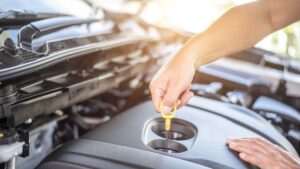
A well-maintained brake system is crucial for safe driving. Regularly inspecting brake pads, rotors, and calipers helps detect signs of wear or damage early on, preventing brake failure and ensuring reliable stopping power. Flushing brake fluid at recommended intervals removes contaminants and moisture, preserving the integrity of brake components and preventing corrosion. Ignoring brake maintenance can compromise your safety and lead to costly repairs.
Your vehicle’s brake system is one of its most critical safety components, allowing you to slow down and stop safely when necessary. Proper brake maintenance is essential for ensuring reliable stopping power and preventing brake failure, especially in emergency situations. Regularly inspecting brake pads, rotors, and calipers for signs of wear, damage, or corrosion is essential for detecting potential issues early on and addressing them before they escalate into more significant problems.
Brake pads are designed to wear down over time as they make contact with the rotors, providing friction and slowing down the vehicle. As brake pads wear down, they become less effective at stopping the vehicle and can cause damage to the rotors if not replaced promptly. Regularly inspecting brake pads for thickness and wear indicators and replacing them as needed is essential for maintaining reliable braking performance and preventing damage to other brake components.
Electrical System: Powering Your Vehicle’s Vital Functions
The electrical system is responsible for powering essential functions such as starting the engine, charging the battery, and operating lights and accessories. Regularly checking the battery, alternator, and starter ensures reliable starting and charging, preventing unexpected breakdowns. Inspecting wiring and connections for signs of damage or corrosion helps prevent electrical issues and ensures the proper functioning of all vehicle systems.
Your vehicle’s electrical system is like its nervous system, transmitting signals and power to various components and systems throughout the vehicle. Proper maintenance of the electrical system is essential for ensuring the reliable operation of essential functions such as starting the engine, charging the battery, and operating lights, wipers, and other accessories. Regularly checking key components such as the battery, alternator, and starter is essential for preventing unexpected breakdowns and ensuring that your vehicle starts and runs smoothly.
The battery is the heart of your vehicle’s electrical system, providing the power needed to start the engine and operate electrical accessories when the engine is off. Regularly checking the battery for signs of corrosion, leaks, or damage, as well as testing its voltage and charging capacity is essential for ensuring reliable starting and electrical power. Replacing the battery at recommended intervals, typically every three to five years is essential for preventing unexpected failures and ensuring that your vehicle starts when you need it to.
The alternator is responsible for charging the battery and powering the electrical system when the engine is running. It converts mechanical energy from the engine into electrical energy, which is then used to recharge the battery and operate electrical accessories. Regularly checking the alternator for signs of wear, damage, or malfunction, as well as testing its output voltage and charging capacity, is essential for ensuring the reliable operation of the electrical system. Replacing the alternator at recommended intervals, typically every 100,000 miles or so, is essential for preventing unexpected failures and ensuring that your vehicle’s electrical system functions properly.
Exterior Maintenance: Protecting Your Investment
The exterior of your vehicle is constantly exposed to the elements, making regular maintenance essential for preserving its appearance and value. Washing and waxing your vehicle regularly removes dirt, grime, and contaminants that can cause paint damage and corrosion. Inspecting for chips, scratches, and rust spots allows for timely repairs, preventing further deterioration and preserving resale value. Additionally, applying a protective coating to vulnerable areas such as the undercarriage and wheel wells helps prevent rust and corrosion.
Your vehicle’s exterior is its first line of defense against the elements, protecting it from dirt, debris, UV radiation, and corrosive substances such as road salt and bird droppings. Proper maintenance of the exterior is essential for preserving its appearance and protecting its underlying structure from damage. Regular washing and waxing remove dirt, grime, and contaminants that can scratch or etch the paint, as well as provide a protective barrier against UV radiation and moisture.
Regularly inspecting your vehicle’s exterior for chips, scratches, and rust spots is essential for identifying potential issues early on and addressing them before they escalate into more significant problems. Chips and scratches in the paint can expose bare metal to moisture and corrosion, while rust spots can spread rapidly and compromise the structural integrity of the vehicle. Promptly repairing chips, scratches, and rust spots with touch-up paint or professional refinishing helps prevent further deterioration and preserves the appearance and value of your vehicle.
Moreover, applying a protective coating to vulnerable areas such as the undercarriage, wheel wells, and lower body panels can help prevent rust and corrosion caused by exposure to moisture, road salt, and other corrosive substances. Rust and corrosion can weaken structural components and compromise the safety and integrity of your vehicle, so taking proactive measures to protect vulnerable areas is essential for maintaining its appearance and value. There are various protective coatings available, including undercoatings, rust inhibitors, and ceramic coatings, each offering different levels of protection and durability.
Interior Care: Creating a Comfortable Environment
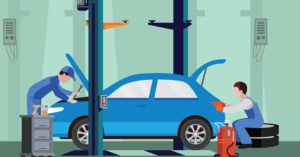
Maintaining the interior of your vehicle not only enhances comfort but also contributes to its overall value. Regular vacuuming and cleaning of upholstery, carpets, and surfaces remove dirt, debris, and allergens, creating a healthier and more pleasant driving environment. Treating leather and vinyl surfaces with conditioner helps prevent drying, cracking, and fading, preserving their appearance and longevity. Additionally, using sunshades and UV protectants helps prevent sun damage and fading of interior materials.
The interior of your vehicle is where you spend most of your time, so keeping it clean, comfortable, and well-maintained is essential for your overall driving experience. Regular vacuuming and cleaning of upholstery, carpets, and surfaces remove dirt, dust, and debris that can accumulate over time and cause odors, stains, and allergens. Using a vacuum with attachments and brushes allows you to reach into tight spaces and crevices, ensuring thorough cleaning and removal of dirt and debris.
Treating leather and vinyl surfaces with conditioner helps prevent drying, cracking, and fading caused by exposure to sunlight, heat, and humidity. Leather and vinyl are susceptible to damage from UV radiation, so applying a conditioner with UV protectants helps maintain their suppleness and appearance over time. Additionally, using a leather cleaner and conditioner with moisturizing ingredients helps replenish natural oils and nutrients, keeping leather soft, flexible, and resistant to cracking and fading.
Moreover, using sunshades and UV protectants helps prevent sun damage and fading of interior materials such as upholstery, carpets, and dashboard surfaces. Sunlight contains UV radiation, which can penetrate glass and cause fading, discoloration, and deterioration of interior materials over time. Using a reflective or opaque sunshade in the windshield and windows helps block UV radiation and reduce heat buildup inside the vehicle, protecting interior surfaces and prolonging their lifespan.
Conclusion: The Key to Longevity and Performance
In conclusion, the art and science of car maintenance are essential for keeping your vehicle in top condition and ensuring its longevity and performance. By understanding your vehicle’s specific needs and following recommended maintenance procedures, you can enjoy a smoother, safer ride for years to come. Regular maintenance of fluids, engine, tires, brakes, electrical system, exterior, and interior not only enhances safety and reliability but also preserves the value of your investment. Make car maintenance a priority, and reap the rewards of a well-cared-for vehicle.


